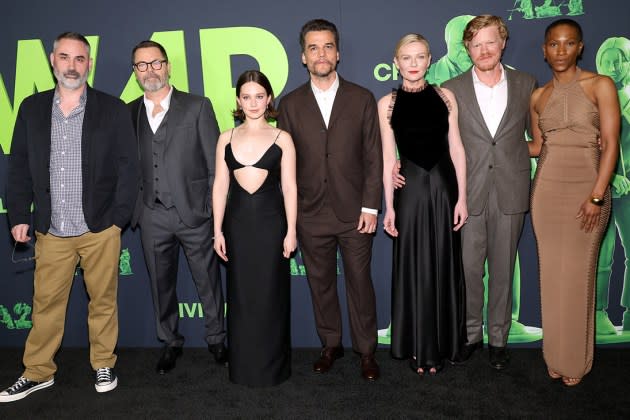Why California and Texas Are Allies in ‘Civil War’

Civil War, the buzzy A24 film that follows a team of journalists as they race to Washington, D.C., to document American citizens fighting each other across the country and rebel forces descending on the White House, throws in one surprise right off the bat: California and Texas, typically political opposites, are allies in the war.
At a special screening in Los Angeles on Tuesday, writer-director Alex Garland explained the “intentional” decision to unite the two, saying it was “partly to get around a kind of reflexive, polarizing position that people might fall into, that’s one thing, but actually that’s not the main thing. The main thing is to do with how the president is presented and what can be inferred from that.” The president, played by Nick Offerman, has disbanded the FBI, has used air strikes on American citizens and has established himself as a three-term leader.
More from The Hollywood Reporter
Cillian Murphy Reveals Post-Oscar Project: New Versace Icons Campaign With Anne Hathaway
Hannah Waddingham Says She Has "Chronic Claustrophobia" After 'Game of Thrones'
“Then it’s saying that two states that have a different political position have said, ‘Our political difference is less important than this,'” Garland continued. “And then the counter to that is if you cannot conceive of that, what you’re saying is that your polarized political position would be more important than a fascist president. Which, when you put it like that, I would suggest, is insane. That’s an insane position to hold. So it’s sort of an oblique commentary and I think that’s how the film works in general. It’s not explaining this stuff but it’s also not avoiding this stuff.”
Director Alex Garland shares his reasoning for paring up California and Texas in #CivilWar at the premiere of the film pic.twitter.com/4SFfDrHKtq
— The Hollywood Reporter (@THR) April 3, 2024
Offerman added that the two states working together — who in the film have formed the Western Forces — “serves a few purposes but one of them is to immediately say, ‘This is not supposed to represent the world as it is.’ But I think it also serves to say the way the world is working these days, anything is possible and so quickly.”
Garland first wrote the story in 2020, and said releasing it now — roughly six months before the major 2024 election — “is really strange, just the sense of déjà vu.”
“I think the film was written really not just about this country, about a weird state we’re in to do with division and polarization and extremism, the things that flow from populism,” he said. “At the moment I wrote it, I don’t think I imagined it would take four years to get to this point, but also if it did take four years, that things would be so similar.”
Kirsten Dunst, Wagner Moura, Stephen McKinley Henderson and Cailee Spaeny star in the project as war journalists, and downplay any concerns that the film may incite any kind of real-life violence or political reaction.
Kirsten Dunst says she's not worried about #CivilWar causing any violence in the real-world pic.twitter.com/EqdRiC3u3A
— The Hollywood Reporter (@THR) April 3, 2024
“It’s a movie and it’s meant to start conversations and I think it really lets the audience decide what they want to put onto it,” Dunst said. “It’s not partisan in any way, I think it’s actually more of an anti-war film if anything.”
Moura added that he hopes there isn’t any violence “because this is exactly what the film is not about. The film doesn’t have a political agenda, you really cannot say that this is a liberal film, a conservative film, it’s a film that says that polarization — I won’t say would lead to any civil war — but can lead to social conflict and it’s a problem for democracies.”
Offerman also weighed in, noting that after all the online chatter ahead of its release, “when you see the movie you’re like, ‘Oh shit, it’s actually just super-intelligent and a kickass movie that none of us can legitimately get mad about because it’s just a beautiful piece of art.'” He additionally noted that any comparisons to his character and Donald Trump while shooting “didn’t even come up. It’s so unrelated to any actual factions or politicians,” and commended Garland for not including real-life political points in the story.
Nick Offerman says there were zero discussions about Donald Trump during the making of #CivilWar pic.twitter.com/A97I8jgeiE
— The Hollywood Reporter (@THR) April 3, 2024
“It would be so easy to make this movie and lay in some Easter eggs and some of this or that, but you would lose half your audience this way or the other,” Offerman said. “Instead, this is like a great novel, it’s for everybody to say, ‘Oh, maybe heading toward war in our country is not the best route, maybe we should reconsider the direction we’re heading.'”
Moura said he’s taken that into his own life as well, and after wrapping the film, “I really started to reach out to people who think differently politically and listen to them, because if you believe in democracy — if you’re not some crazy racist, homophobic, kind of crazy thing — I’m really willing to listen to you and I was very surprised to see that there’s a lot of common ground. If our differences are only like how the state deals with things, we should definitely listen to each other and talk to each other and avoid this hate.”
At the premiere, Wagner Moura says working on #CivilWar inspired him to talk to people who don't share his political views pic.twitter.com/B6Xc4rs0XE
— The Hollywood Reporter (@THR) April 3, 2024
Civil War hits theaters April 12.
Best of The Hollywood Reporter

